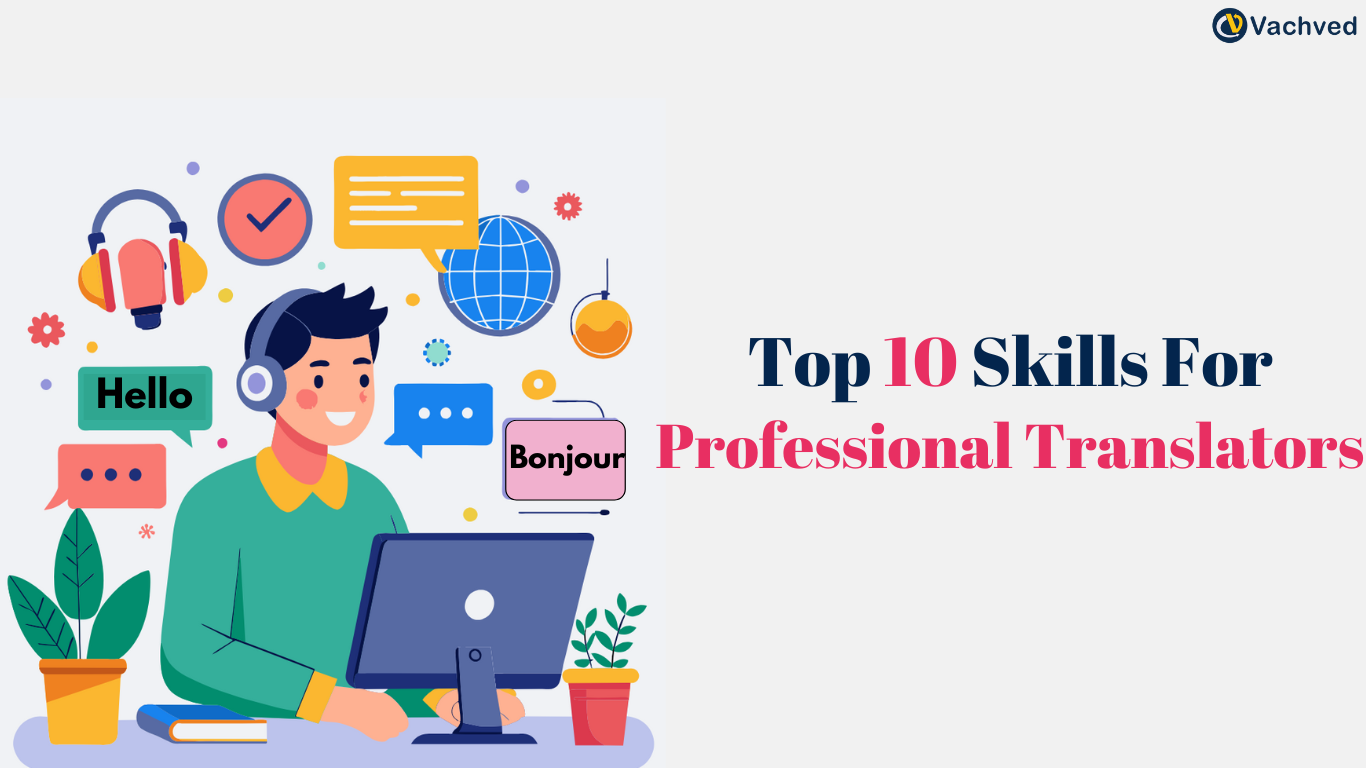Top 10 Skills for Professional Translators
Translation is not just converting words from one language to another; it is about communicating the message effectively. Whether you’ve to translate a novel, a legal document, or a website, having the necessary skills is important for delivering high-quality translations that engage with your target audience. Some of those skills to become Professional Translators are mentioned here-
Language Expertise-
Language proficiency means translators must be fluent in both their source and target languages. Understanding the basics of grammar, syntax, and vocabulary is important for creating accurate and natural-sounding translations.
One can not separate languages with culture, and thus translators must be good at understanding cultural nuances and commonly used idioms. Cultural sensitivity enables translators to tailor their translations to the cultural context of the target audience, ensuring that the message is easily understood by the audience.
Research Skills-
Translators frequently come across specialized vocabulary and industry-specific jargon, particularly when working on scientific or academic documents. Strong research skills are required to ensure translation accuracy and relevancy, as well as text consistency.
When dealing with unknown terms or concepts, professional translators understand how to perform deep research to create the most accurate and acceptable translations. This may require checking dictionaries, specialized glossaries, academic papers, or to ask subject matter experts to ensure that the translation is accurate and contextually suitable.
Attention to Detail-
Translators are required to pay attention to detail in order to avoid errors and inconsistencies. Translators must carefully review and revise their work to make sure that each word and phrase is correctly translated while maintaining the overall meaning.
Also, Professional translators have to pay great attention to formatting, punctuation, and style consistency to ensure that the translated document is of professional quality. This meticulous attention to detail ensures that the final translation is clear and of the highest quality.
Time Management-
In the fast-paced world of translation, time management is essential to complete the task in the given time. Translators must be able to successfully manage their workload, meet tight deadlines, and prioritize tasks to ensure that projects are delivered on time and to a high quality.
To meet tight deadlines without losing quality, Professional translators use effective time management tactics such as prioritizing assignments, breaking them down into manageable chunks, and streamlining their workflow with productivity tools. By being organized and focused, translators can deliver high-quality translations on time, earning their clients’ trust and satisfaction.
Communication Skills-
Clear and effective communication is important for engaging with clients and colleagues, clarifying requirements, and accurately communicating complicated ideas. Translators must be able to communicate themselves effectively and simply in both written and oral forms.
Clear communication is especially crucial when dealing with clients who may be unfamiliar with the translation process or vocabulary. Professional translators understand how to communicate successfully with customers, including clarifying inquiries, offering regular project updates, and responding to any complaints or feedback in a fast and professional manner.
Technological Expertise-
In today’s digital age, translators have access to a variety of translation software and tools that can help speed up the translation process and increase productivity. From terminology management to quality assurance, technical expertise is important for being competitive in the market.
Professional translators are good at using translation software, such as CAT (Computer-Assisted Translation) tools, which help in the automation of repetitive tasks, ensuring consistency between translations, and preserving translation memory for future projects. By using technology, translators may work more effectively, offer higher-quality translations, and meet their clients’ changing needs.
Subject Matter Expertise-
Many translators specialize in specific sectors, such as legal, medical, financial or technical translation. Developing experience in a particular subject area enables translators to generate more accurate translations while also better understanding their clients’ demands.
To be successful in a particular sector, translators must have a thorough understanding of the subject matter, including industry-specific vocabulary, concepts, and rules. Professional translators maintain their knowledge and abilities through continued education, professional development, and collaboration with subject matter experts, allowing them to create translations that are both accurate and relevant.
Adaptability-
Translators must be versatile and willing to change, whether it’s adjusting translations based on client input or learning new languages and skills to stay updated with industry trends. Being adaptable enables translators to meet the changing needs of their clients and survive in a dynamic and diversified global industry.
In the ever-changing world of translation, professional translators see change as a chance to grow and improve. They are willing to modify their approach, procedures, and methodologies to match the specific needs of each project and client, to make sure that their translations are still relevant, accurate, and powerful in today’s dynamic environment.
Problem-Solving Skills-
Translators frequently face problems such as confusing language, cultural nuances, and technical issues. The capacity to think critically and creatively about these problems is important for creating high-quality translations that successfully express the desired meaning of the message.
Professional translators have to approach problems with a problem-solving mindset, examining the underlying reasons, investigating alternative techniques, and cooperating with colleagues or subject matter experts to develop the most feasible answers. Translators can overcome barriers by utilizing their analytical abilities and creativity to deliver translations that match their clients’ demands and expectations.
Emotional Intelligence-
Translating is more than just words; it’s also about understanding the context and emotions that surround those words. Translators with strong emotional intelligence can better capture the tone, intent, and nuances of the original text, resulting in translations that connect with the target audience on a deeper level.
Professional translators not only consider the actual meaning of words, but also the underlying emotions, cultural implications, and literary devices present in the original text. Understanding the background and subtext of the source material allows translators to create translations that generate the same emotional impact and effect as the original, establishing deeper connections with the target audience.
Conclusion
In conclusion, mastering the art of translation requires a combination of skill sets. As you seek out translation services, whether for personal or professional needs, remember to prioritize all these above-mentioned essential skills to ensure that you receive the top quality translations possible.
And when it comes to finding reliable and skilled translators, consider partnering with Vachved. With our team of experienced professionals and commitment to excellence, we are here to meet all your translation needs.







